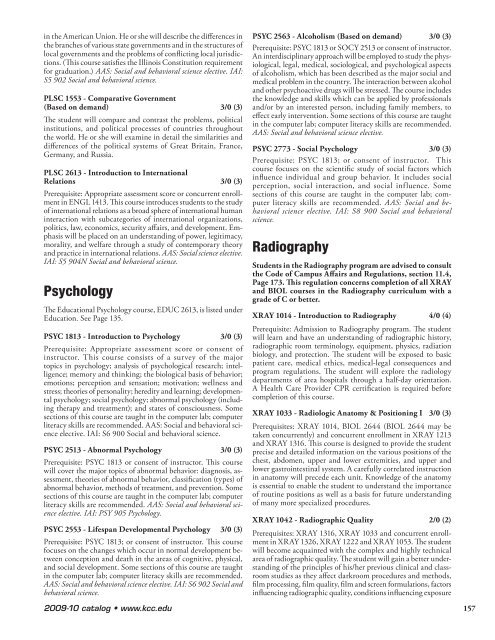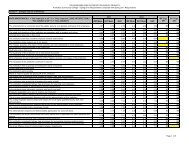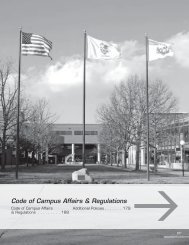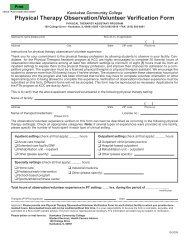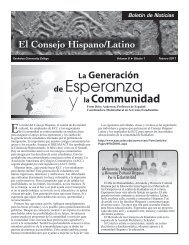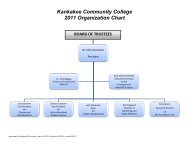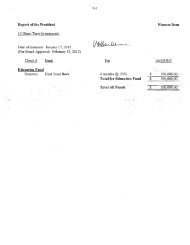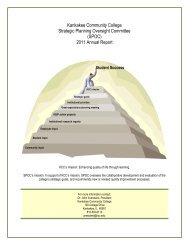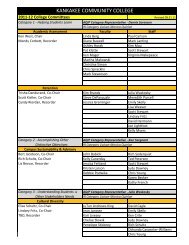09-10_Academiccatalog(Fullcatalog4.30mb) - Kankakee ...
09-10_Academiccatalog(Fullcatalog4.30mb) - Kankakee ...
09-10_Academiccatalog(Fullcatalog4.30mb) - Kankakee ...
You also want an ePaper? Increase the reach of your titles
YUMPU automatically turns print PDFs into web optimized ePapers that Google loves.
in the American Union. He or she will describe the differences in<br />
the branches of various state governments and in the structures of<br />
local governments and the problems of conflicting local jurisdictions.<br />
(This course satisfies the Illinois Constitution requirement<br />
for graduation.) AAS: Social and behavioral science elective. IAI:<br />
S5 902 Social and behavioral science.<br />
PLSC 1553 - Comparative Government<br />
(Based on demand) 3/0 (3)<br />
The student will compare and contrast the problems, political<br />
institutions, and political processes of countries throughout<br />
the world. He or she will examine in detail the similarities and<br />
differences of the political systems of Great Britain, France,<br />
Germany, and Russia.<br />
PLSC 2613 - Introduction to International<br />
Relations 3/0 (3)<br />
Prerequisite: Appropriate assessment score or concurrent enrollment<br />
in ENGL 1413. This course introduces students to the study<br />
of international relations as a broad sphere of international human<br />
interaction with subcategories of international organizations,<br />
politics, law, economics, security affairs, and development. Emphasis<br />
will be placed on an understanding of power, legitimacy,<br />
morality, and welfare through a study of contemporary theory<br />
and practice in international relations. AAS: Social science elective.<br />
IAI: S5 904N Social and behavioral science.<br />
Psychology<br />
The Educational Psychology course, EDUC 2613, is listed under<br />
Education. See Page 135.<br />
PSYC 1813 - Introduction to Psychology 3/0 (3)<br />
Prerequisite: Appropriate assessment score or consent of<br />
instructor. This course consists of a survey of the major<br />
topics in psychology; analysis of psychological research; intelligence;<br />
memory and thinking; the biological basis of behavior;<br />
emotions; perception and sensation; motivation; wellness and<br />
stress; theories of personality; heredity and learning; developmental<br />
psychology; social psychology; abnormal psychology (including<br />
therapy and treatment); and states of consciousness. Some<br />
sections of this course are taught in the computer lab; computer<br />
literacy skills are recommended. AAS: Social and behavioral science<br />
elective. IAI: S6 900 Social and behavioral science.<br />
PSYC 2513 - Abnormal Psychology 3/0 (3)<br />
Prerequisite: PSYC 1813 or consent of instructor. This course<br />
will cover the major topics of abnormal behavior: diagnosis, assessment,<br />
theories of abnormal behavior, classification (types) of<br />
abnormal behavior, methods of treatment, and prevention. Some<br />
sections of this course are taught in the computer lab; computer<br />
literacy skills are recommended. AAS: Social and behavioral science<br />
elective. IAI: PSY 905 Psychology.<br />
PSYC 2553 - Lifespan Developmental Psychology 3/0 (3)<br />
Prerequisite: PSYC 1813; or consent of instructor. This course<br />
focuses on the changes which occur in normal development between<br />
conception and death in the areas of cognitive, physical,<br />
and social development. Some sections of this course are taught<br />
in the computer lab; computer literacy skills are recommended.<br />
AAS: Social and behavioral science elective. IAI: S6 902 Social and<br />
behavioral science.<br />
PSYC 2563 - Alcoholism (Based on demand) 3/0 (3)<br />
Prerequisite: PSYC 1813 or SOCY 2513 or consent of instructor.<br />
An interdisciplinary approach will be employed to study the physiological,<br />
legal, medical, sociological, and psychological aspects<br />
of alcoholism, which has been described as the major social and<br />
medical problem in the country. The interaction between alcohol<br />
and other psychoactive drugs will be stressed. The course includes<br />
the knowledge and skills which can be applied by professionals<br />
and/or by an interested person, including family members, to<br />
effect early intervention. Some sections of this course are taught<br />
in the computer lab; computer literacy skills are recommended.<br />
AAS: Social and behavioral science elective.<br />
PSYC 2773 - Social Psychology 3/0 (3)<br />
Prerequisite: PSYC 1813; or consent of instructor. This<br />
course focuses on the scientific study of social factors which<br />
influence individual and group behavior. It includes social<br />
perception, social interaction, and social influence. Some<br />
sections of this course are taught in the computer lab; computer<br />
literacy skills are recommended. AAS: Social and behavioral<br />
science elective. IAI: S8 900 Social and behavioral<br />
science.<br />
Radiography<br />
Students in the Radiography program are advised to consult<br />
the Code of Campus Affairs and Regulations, section 11.4,<br />
Page 173. This regulation concerns completion of all XRAY<br />
and BIOL courses in the Radiography curriculum with a<br />
grade of C or better.<br />
XRAY <strong>10</strong>14 - Introduction to Radiography 4/0 (4)<br />
Prerequisite: Admission to Radiography program. The student<br />
will learn and have an understanding of radiographic history,<br />
radiographic room terminology, equipment, physics, radiation<br />
biology, and protection. The student will be exposed to basic<br />
patient care, medical ethics, medical-legal consequences and<br />
program regulations. The student will explore the radiology<br />
departments of area hospitals through a half-day orientation.<br />
A Health Care Provider CPR certification is required before<br />
completion of this course.<br />
XRAY <strong>10</strong>33 - Radiologic Anatomy & Positioning I 3/0 (3)<br />
Prerequisites: XRAY <strong>10</strong>14, BIOL 2644 (BIOL 2644 may be<br />
taken concurrently) and concurrent enrollment in XRAY 1213<br />
and XRAY 1316. This course is designed to provide the student<br />
precise and detailed information on the various positions of the<br />
chest, abdomen, upper and lower extremities, and upper and<br />
lower gastrointestinal system. A carefully correlated instruction<br />
in anatomy will precede each unit. Knowledge of the anatomy<br />
is essential to enable the student to understand the importance<br />
of routine positions as well as a basis for future understanding<br />
of many more specialized procedures.<br />
XRAY <strong>10</strong>42 - Radiographic Quality 2/0 (2)<br />
Prerequisites: XRAY 1316, XRAY <strong>10</strong>33 and concurrent enrollment<br />
in XRAY 1326, XRAY 1222 and XRAY <strong>10</strong>53. The student<br />
will become acquainted with the complex and highly technical<br />
area of radiographic quality. The student will gain a better understanding<br />
of the principles of his/her previous clinical and classroom<br />
studies as they affect darkroom procedures and methods,<br />
film processing, film quality, film and screen formulations, factors<br />
influencing radiographic quality, conditions influencing exposure<br />
20<strong>09</strong>-<strong>10</strong> catalog • www.kcc.edu<br />
157


